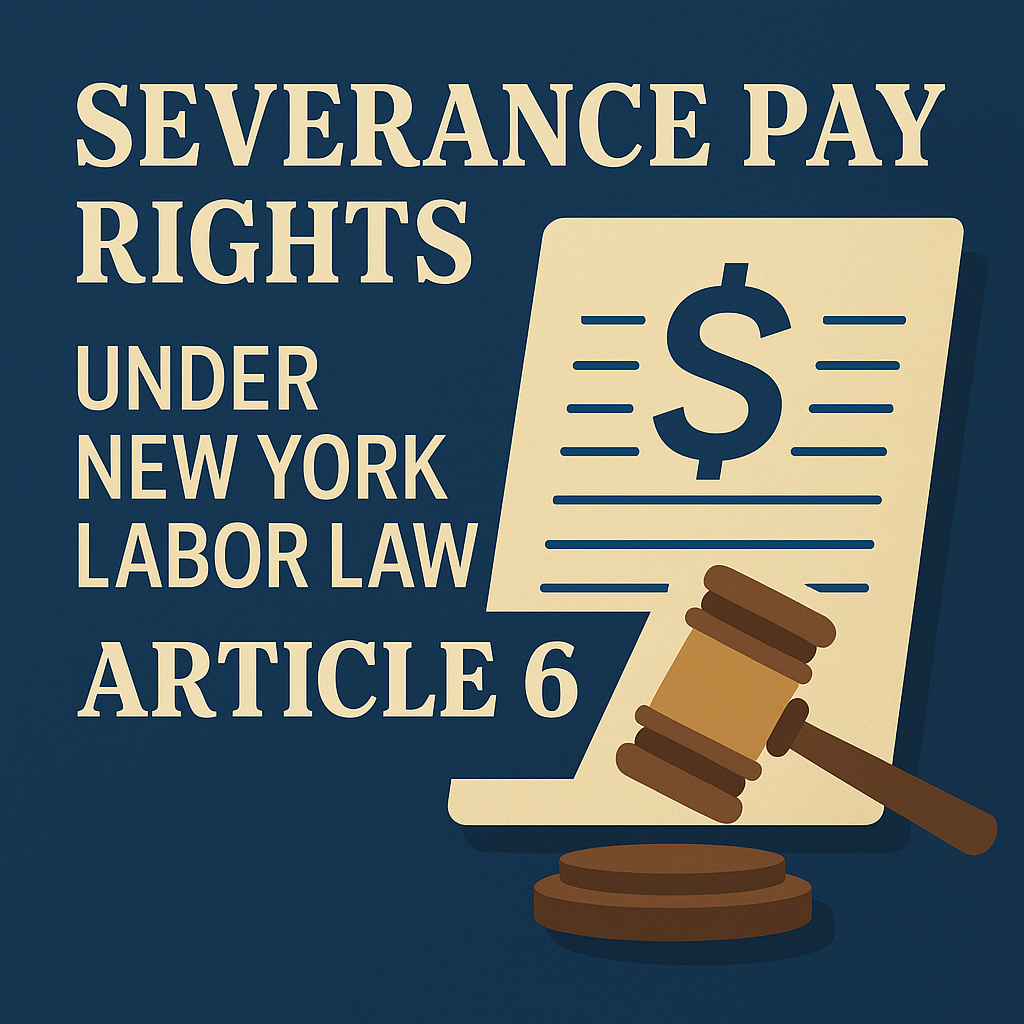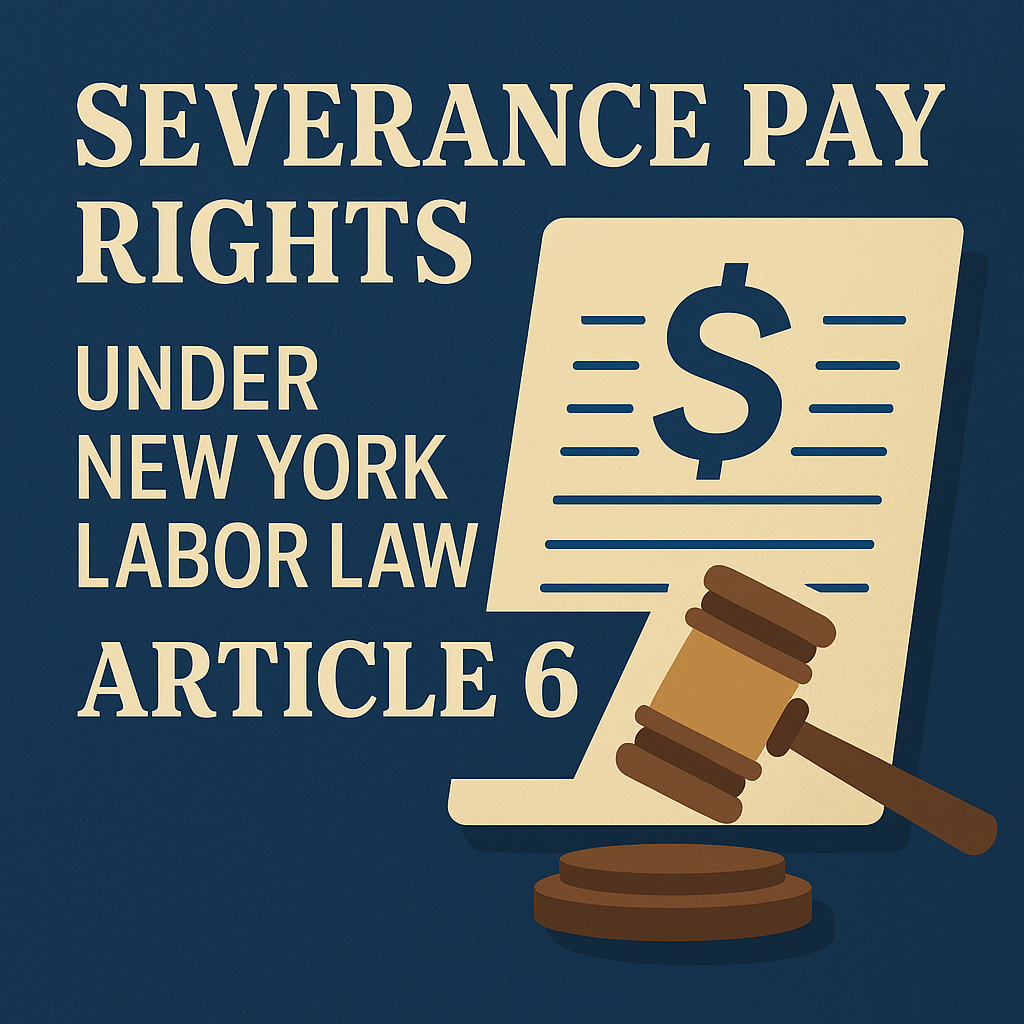Does the New York Labor Law permit manual employees who aren’t paid on time to receive liquidated damages? The First Department answered “yes” in Vega v. CM & Assocs. Constr. Mgmt., LLC, 175 A.D.3d 1144 (1st Dept. 2019). Most courts have followed Vega.
Background
Labor Law § 191 requires that manual employees be paid at least weekly. And Labor Law § 198 provides for liquidated damages equal to any underpaid wages.
In Vega, the First Department held that a manual worker could seek liquidated damages under Labor Law § 198(1-a) for late-paid wages since § 198(1-a) expressly provides a private right of action for § 191 violations. Vega also held that “even if Labor Law § 198 does not expressly authorize a private action for violation of the requirements of Labor Law § 191, a remedy may be implied since plaintiff is one of the class for whose particular benefit the statute was enacted, the recognition of a private right of action would promote the legislative purpose of the statute and the creation of such a right would be consistent with the legislative scheme.” Id., 175 A.D.3d at 1146.
Thus, manual workers who were paid every two weeks (bi-weekly) are generally entitled to liquidated damages equal to 50% of the wages paid to them since the first week’s wages in the two-week pay cycle were paid late. Valdez v. Michpat & Fam, 2022 U.S. Dist. LEXIS 3708, at *36 (E.D.N.Y. Jan. 6, 2022) (citing Vega).
Section 198
Labor Law § 198 provides, in pertinent part:
In any action instituted in the courts upon a wage claim … in which the employee prevails, the court shall allow such employee to recover the full amount of any underpayment … and, unless the employer proves a good faith basis to believe that its underpayment of wages was in compliance with the law, an additional amount as liquidated damages equal to [100%] of the total amount of the wages found to be due …
N.Y. Lab. Law § 198(1-a).
A wage “underpayment” is thus a prerequisite to any liquidated damages award under § 198.
What is an “underpayment” of wages?
Vega found that late-paid wages are underpaid wages because “[t]he moment that an employer fails to pay wages in compliance with section 191(1)(a), the employer pays less than what is required.”[1] To further support that conclusion, Vega cited Fair Labor Standards Act (FLSA) case law allowing liquidated damages for late-paid wages based on an implicit prompt payment requirement.[2]
Accordingly, if liquidated damages can be awarded based on an implicit prompt payment requirement under the FLSA, then it would seem particularly incongruous to disallow liquidated damages based on an explicit prompt payment requirement under the Labor Law Article 6.
But Vega’s critics have a counter-argument: “statutory language is generally given its natural and most obvious meaning[,]”[3] and a “late payment” is not the most natural and obvious meaning of “underpayment.” However, section 198 does not limit the word “underpayment” to its most obvious meaning. To the contrary, “underpayment” in section 198 is modified by “any”—as in, “any underpayment”—and “any” means “‘all’ or ‘every’ and imports no limitation.”[4]
Since the word “any” generally indicates a legislative “intent to sweep broadly to reach all varieties of the item referenced,”[5] it encompasses “indirect” or “constructive” varieties of the items referenced. Thus, it is reasonable to conclude that the sweeping phrase “any underpayment” encompasses not just immediately recognizable underpayments, but “de facto” underpayments as well.[6] Late pay fits under the umbrella of “any underpayment” because it has less value than timely pay.
Conclusion
Manual employees in New York have the right to be paid at least once a week. It’s important for them to know their potential remedies if their employers fail to do so.
*The information provided in this blog post does not constitute legal advice, and may be incomplete, incorrect, or out of date. It is provided for informational purposes only.
[1] Id., 175 A.D.3d at 1145.
[2] Id., 175 A.D.3d at 1146 (citing Brooklyn Savings Bank v O’Neil, 324 US 697, 707 (1945)). See also Day v. Tractor Supply Co., 2022 U.S. Dist. LEXIS 217201, at *16-17 (W.D.N.Y. Nov. 30, 2022) (citing Biggs v. Wilson, 1 F.3d 1537, 1539-40 [9th Cir. 1993] for the proposition that there is no known “principled way” “to distinguish between late payment and nonpayment,” and “[a]ny kind of sliding scale [] would force employees, employers, and courts alike to guess when ‘late payment’ becomes ‘nonpayment.’”); Rogers v. City of Troy, 148 F.3d 52, 59 (2d Cir. 1998).
[3] Price v. Price, 69 N.Y.2d 8, 15 (1986) (citations omitted).
[4] Kimmel v. State of N.Y., 29 N.Y.3d 386, 393 (2017) (citation omitted); see also New Amsterdam Cas. Co. v. Stecker, 3 N.Y.2d 1, 6 (1957) (“the word ‘any’ is as inclusive as any other word in the English language.”) (citation omitted).
[5] Cohen v. JP Morgan Chase & Co. ., 498 F.3d 111, 117 (2d Cir.2007) (citing, inter alia, United States v. Gonzales, 520 U.S. 1, 5 (1997)).
[6] See, e.g., Charles v. Diamond, 47 A.D.2d 426, 430 (4th Dep’t 1975) (law conferring jurisdiction over claims for the appropriation of “any real or personal property” extends to a claim arising out of an unconstitutional “de facto appropriation of private property”) (citation omitted); Procter & Gamble Co. v. Chesebrough-Pond’s Inc., 747 F.2d 114, 118-19 (2d Cir. 1984) (phrase “any false description or representation” in Lanham Act embraces false “innuendo, indirect intimations, and ambiguous suggestions”); Ennabe v. Manosa, 319 P.3d 201, 212, 58 Cal.4th 697, 714 (Cal. 2014) (“Use of the term ‘any’ to modify the words ‘transaction’ and ‘consideration’ demonstrates the Legislature intended the law to have a broad sweep and thus include both indirect as well as direct transactions.”); U.S. v. Quong, 303 F.2d 499, 503 (6th Cir. 1962) (“The term ‘any interest’ must be defined in the broadest sense and includes any interest whatsoever, direct or indirect.”); Grogan v. Hillman, 930 So.2d 520, 523 (Ala.Civ.App. 2005) (“Given its natural and plain meaning, the term ‘any possession’ includes ‘constructive possession.’”); State v. Bradley, 782 N.W.2d 674, 679 (S.D. 2010) (phrase “any custody” includes “constructive” custody) (citing Murphy v. United States, 481 F.2d 57, 61 (8th Cir.1973)).
* This blog is for informational purposes only and is not intended to provide legal advice. The information contained in this blog is provided only as general information and may not reflect the most current legal developments. No representations or warranties are made with respect to the accuracy or completeness of the information contained in this blog, and the blog is not intended to be a substitute for legal advice from a licensed attorney. The information in this blog is not intended to create, and receipt of it does not constitute, an attorney-client relationship. Readers should not act upon this information without seeking professional legal counsel.





